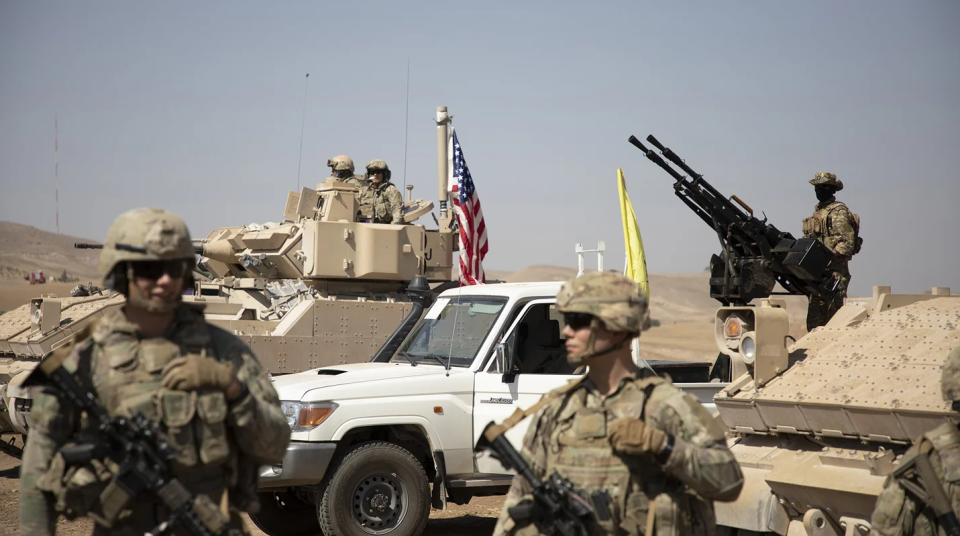By : Jeff Schogol , TASK & PURPOSE
It’s been more than three years since the Islamic State appeared to be defeated after the terror group lost all the territory it had once controlled, and yet ISIS continues to wage an insurgency in both Iraq and Syria, according to the most recent quarterly report from the Lead Inspector General for Operation Inherent Resolve.
“Overall, compared with the same period in 2021, the frequency and severity of ISIS-claimed attacks decreased dramatically in Iraq, while attacks in Syria increased significantly, marking a rebound from historically low levels the previous year,” the report says.
Between July and September, ISIS carried out 74 attacks in Syria and 73 attacks in Iraq, the report says. Small cells based in rural areas mostly conducted hit-and-run attacks against local security forces along with occasional high-profile attacks in cities.
While roughly 2,500 U.S. troops are still in Iraq and another 900 service members are in Syria to help prevent ISIS from mounting a comeback, the report cites several factors beyond the U.S. military’s control that have made their mission more difficult, including third-party actors, such as Iran; political instability, especially Iraq’s problems forming a government; and social-economic instability.
In Syria, years of conflict and a collapsed economy have led to widespread displacement of civilians, and drought and the COVID-19 pandemic have increased an already urgent need for international humanitarian assistance, according to the UN Office for the Coordination of Humanitarian Affairs,” the report says. “During the quarter, there was a cholera outbreak in Syria. Iraq also faces economic challenges while stabilization efforts are ongoing, threatening political stability and creating environments that allow [violent] extremist groups to operate.”
For now, the U.S. military’s strategy appears to be to continue to eliminate ISIS leaders. In February the group’s top leader Abu Ibrahim al-Hashimi al-Qurayshi allegedly killed himself along with his wife and children during a U.S. special operations forces raid in Syria. U.S. special operators captured alleged ISIS bombmaker Hani Ahmed Al-Kurdi in June during another raid in Syria. And ISIS leader Mahir al-Agal, described as “a senior leader in the organization who was responsible for plotting attacks outside of Iraq and Syria” in the IG report, was killed in July by a drone strike in Syria.
It is unclear what steps the U.S. government could take to help address some of the political and socio-economic conditions that ISIS and other violent extremist groups have taken advantage of to reconstitute themselves, especially in Syria.
“The volatile political landscape in northeastern Syria complicates execution of the defeat ISIS mission, CJTF-OIR [Combined Joint Task Force Operation Inherent Resolve] said,” according to the report. “ISIS exploits operational seams between conflicting sides and any pause in operations against the group creates opportunities for ISIS to exploit at-risk populations and regenerate its military strength.”
The U.S. military’s mission in Iraq and Syria has been further complicated by third-party countries, including U.S. adversaries Iran and Russia as well as NATO ally Turkey, the report found.
Iranian-backed militia groups carried out six roadside bombs attacks against U.S. and coalition forces in Iraq, as well as a drone attack against the Al Tanf Garrison in Syria, where U.S. forces are based, and a failed drone attack on U.S. forces at Ali al-Salem Airbase in Kuwait, according to the report.
Separately, Iranian officials have claimed to have launched at least 72 missiles against Kurdish groups operating inside Iraq, claiming that they were planning anti-government protests inside Iran, the report says.
Meanwhile, Turkish forces have continued to conduct military operations in Iraq and Syria, some of which have targeted the Syrian Democratic Forces, a group of mostly Kurdish fighters that fights against ISIS with U.S. military support.
“SDF leaders said that defending against Turkish operations jeopardizes their ability to conduct counter-ISIS activities and requires the SDF to balance competing priorities of the counter-ISIS campaign and protecting their communities,” the report says. “Turkish President Recep Tayyip Erdogan’s threat of a full-scale military incursion did not materialize after he failed to obtain support from Syria’s allies Russia and Iran.”
All these factors help to explain how the U.S. military and its allies have managed to inflict severe damage on ISIS but not destroy the group completely.
Since losing its last enclave in March 2019, small pockets of ISIS fighters have remained spread across northern Iraq and Syria “where they occupy temporary hideouts in the countryside and are pursued by our partner forces,” Army Maj. Rachael L. Jeffcoat, a spokeswoman for Operation Inherent Resolve, told Task & Purpose on Thursday.
ISIS has been able to finance itself through smuggling and other illegal activities, and the group has sustained its manpower by radicalizing prisoners and civilians displaced by war who are living in camps, such as the al-Hol displaced persons camp in northeastern Syria where Syrian Democratic Forces spent two weeks in September disrupting an ISIS network, Jeffcoat said.
As of the end of September, about 54,000 people remain in the camp, mostly women and children, according to the Inspector General’s report.
In addition, U.S. and coalition forces in Iraq remain focused on helping Iraqi security forces plan operations against ISIS using troops and aircraft, Jeffcoat said.
“Whilst the ISF [Iraqi security forces] do still require coalition support and advice, the capability of our partner forces on the battlefield is steadily improving,” Jeffcoat said. “In Syria, conditions in both detention facilities and displaced persons camps are austere and history tells us that they are ideal for extremist groups like ISIS to exploit and radicalize vulnerable people,” Jeffcoat said.
With conditions in Syria and Iraq not expected to improve drastically anytime soon, the U.S. military’s mission against ISIS is likely to continue for the foreseeable future.

















